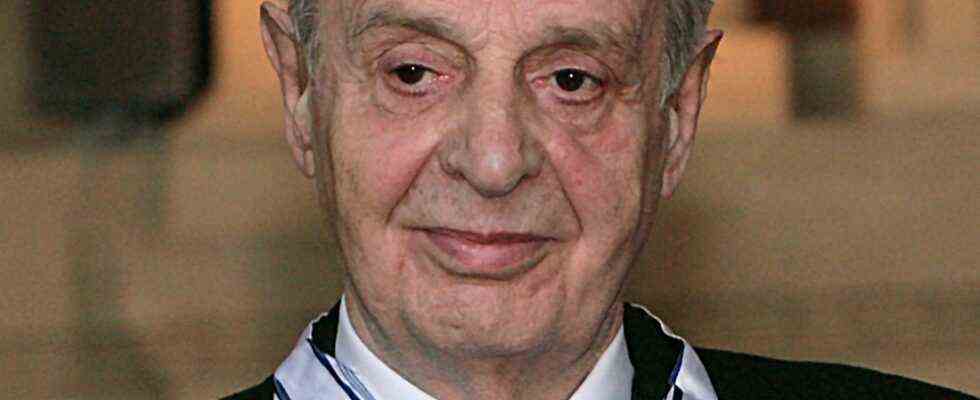When philosophy ceased to want to be a universal science after Hegel’s death, it essentially left three areas of work: the history of its own subject, ethics and epistemology. There is progress in this triad in the historical, at best, and it turns backwards: who came up with which thought, how to understand these thoughts and how they relate to one another can be found out in ever finer gradations. What is allowed, can, want or must, in an ethical sense, can only be clarified in relation to the respective circumstances. And what constitutes knowledge, beyond everything known, is a question in which the mere existence of innumerable approaches or schools testifies to the resounding lack of consequences of the corresponding efforts.
The importance that the philosopher Dieter Henrich, born in Marburg in 1927, had from the sixties to the new millennium not only for German philosophy is based on his attempt to go back to idealism in all seriousness, that is, to philosophy as science. In following the teachings of Kant, Fichte and Hegel (with a final bow to Holderlin) he developed a theory of consciousness in which it seemed once again to deal with the whole of knowing about oneself. Whether he was actually adding something different and correct to Hegel’s “Phenomenology” or “Logic” is at least uncertain.
But his works remained interesting for many philosophers, on the one hand because they served as access to the most mentally difficult works in intellectual history, on the other hand because they aggressively insisted on consciousness as a metaphysical fact, against above all Anglo-Saxon philosophy. Beginning in the eighties, Dieter Henrich also devoted himself to very extensive historical research on the intellectual “constellations” between the philosophers of German idealism, from which the system designs of this school of thought emerged.
He had to “tear himself away” from a cheerful friend because she “undermined” concentration on work
The book with conversations that Matthias Bormuth, professor for the history of ideas at the University of Oldenburg, and Ulrich von Bülow from the German Literature Archive in Marbach, dedicate to the 94-year-old philosopher, is also a kind of “constellation research”. It replaces an intellectual biography, and it does more than that: It shows Dieter Henrich as a “system design” in its own right, from the beginnings of an “I-consciousness” in a life-threatening illness that attacked the two-year-old only child to the great affirmation of ” Life “, as Dieter Henrich describes the music of the conductor Sergiu Celibidache.
The transport network of the Marburg tram became the basis for his systematic thinking, the Fähnleinführer in the Hitler Youth had his first experience in management positions, the academic teacher Hans-Georg Gadamer was challenged in matters of acumen. In Frankfurt, Theodor W. Adorno praised the student as “a true child prodigy”, Karl Jaspers in Heidelberg missed the “hard rock of thinking”, he had to “tear himself away” from a cheerful friend because she was concentrating on work. ” undermined “.
Dieter Henrich: Drawing into thinking. A philosophical autobiography. Munich, Verlag CH Beck, Munich 2021. 282 pages, 28 euros.
It is in the nature of such a self-experience not to really develop “complex and difficult to understand problem areas”, let alone to be able to answer them. People do not confront each other as arguments. In some passages, however, the conversations create intellectual scenarios. This applies to the chapter on Berlin, where Henrich taught between 1960 and 1965, where Michael Theunissen became his assistant, where he met Peter Szondi and where he became a Suhrkamp author.
In addition, one learns how broad the program of this publisher was already back then, further than the later narrowing to “Suhrkamp culture” would suggest, and what high intentions were associated with the word “theory” at that time. And it applies to the remarks about Henrich’s years in the United States, where he became a strict representative of a “continental philosophy” which, as he ironically notes, was expected to be “daring in a trapezoidal art”.
In Munich, where Dieter Henrich was appointed in 1981 and where he stayed after his retirement in 1994, Dieter Henrich devoted himself to historical research in the narrower sense: the “archaeological clarification” about the origins and motivations of idealistic philosophy. Such different things emerged from this work, such as the interpretative development of a fragment with the title “Urtheil und Seyn”, which presumably originates from Holderlin and is today one of the basic texts of speculative philosophizing, as well as the edition of the writings and letters of the theologian Carl Immanuel Diez, a stimulator and mediator of the idealists, whose work had largely been forgotten. In addition, there is talk of appointments and honors, of the long years as President of the International Hegel Association and of the task of explaining the philosophical background to Marcel Proust’s novel “In Search of Lost Time” to the literary scholar Hans Robert Jauß.
Dieter Henrich says of constellation research on philosophical idealism that it was never a calculation, but rather was devoted to “opening up the basic features of a universe” into which “one can write one’s own life”. There is only one philosopher, in Germany and elsewhere, who could utter such a sentence and specifically mean his own by “his own life”. It’s Dieter Henrich.

